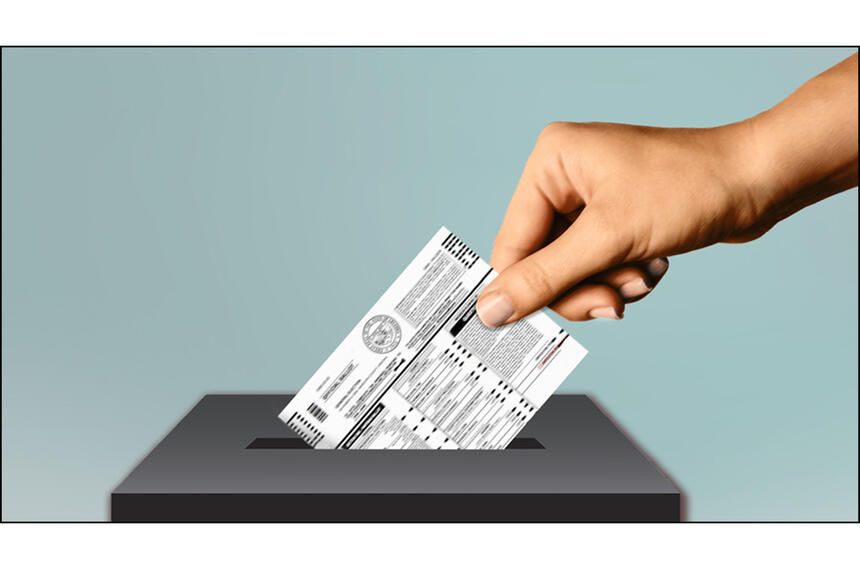
Report: Arizona voter crisis prompts new project to better educate and engage citizen participation
Published on
FOR IMMEDIATE RELEASE
PHOENIX - Arizona is experiencing a voter crisis, with nearly half of the voting-eligible population failing to cast a ballot in the last general election, according to a new report by Morrison Institute for Public Policy as part of voter education/engagement project by Arizona Citizens Clean Elections Commission.
"It almost can be said that voters don't determine elections, non-voters do," said Morrison Institute's Joseph Garcia, who along with David Daugherty co-authored the report, Arizona's Voter Crisis. He cited the fact that while 2.6 million votes were cast in the 2016 Arizona general election, there also were 2.1 million "potential voters" who did not exercise their fundamental right at the polls.
"Potential voters" were identified in the 20-page report as individuals who are either registered to vote but do not cast a ballot and those U.S. citizens who are age 18 or over but do not bother to register. The report is available at MorrisonInstitute.asu.edu and azcleanelections.gov.
"Unfortunately, the term 'voter crisis' is not an exaggeration," said Tom Collins, director of Arizona Clean Elections. "The lack of voter participation and citizen engagement is undermining our democracy. We must continually find new ways to better connect the public with public office in terms of voter education and citizen engagement. This report and project are steps toward that goal."
Clean Elections and Morrison Institute are launching a proactive campaign to address the voter crisis on many fronts including three reports:
• Arizona's Voter Crisis, which examines voting participation and lack thereof over the years, as well as delves into reasons many non-voters cite as reasons for their non-participation.
• Arizona Voter Engagement, which will list various groups' efforts to get more people to become engaged politically and vote, along with contact information for greater involvement.
• Arizona Primary Elections: Primarily Forgotten, a look at often-ignored primary elections in terms of elections being decided de facto before the general election.
Citizens Clean Elections and Morrison Institute also will hold three town hall-style meetings around the state to examine and discuss regional challenges and solutions in improving voter turnout. Local elected officials, voters and "potential voters" will be invited to participate in this effort.
As part of the statewide voter education project, Morrison Institute also provided Arizona Citizens Clean Elections with digestible and easy-to-read information regarding responsibilities and qualifications of each elected office.
The information is presented on three levels: basic, mid and advanced. Such neutral, nonpartisan information will help frequent, infrequent and "potential" voters make the connection between how government works and why it's important to help shape that government, and at the same time perhaps offer frequent voters additional knowledge. After all, it's important not only that more people vote but also that more people know for what and for whom they're voting.
As a democracy, we cannot be shackled by apathy. We must unlock our full potential, and voter education is the key to improving voter participation at the ballot box. Otherwise, we are stuck with some disappointing if not alarming numbers, as the report notes.
During the 2016 general election, one quarter of registered voters in Arizona did not to vote even though it was one of the most contentious elections in recent memory, combined with the fact that presidential elections traditionally attract many more voters to the polls than off-year elections.
During a typical presidential election year, voter turnout among Arizona registered voters in the general election is in the mid-70 percent range, while turnout for non-presidential elections is between 46 percent and 60 percent.
Turnout for primary elections is significantly smaller than turnout for general elections. Between 20 percent and 30 percent of voters participate in primary elections in Arizona. This fact cannot be underplayed since primary elections often determine who will be representing voters in Congress and state legislatures due to many districts predominately favoring one political party over the other.
Thus far the voter crisis has failed to capture the collective awareness or concerted response of, say, the opioid epidemic, but the threat to our community health is no less real. The first step to responding to a crisis is to first admit there is a crisis. Arizona's voter crisis is no different and must be addressed from many angles in a concerted and sustained effort. As a representative government, our very democracy is in the balance.
Of course, Arizona's voting crisis cannot be solved in a single election cycle - or even a couple of election cycles. But it can be changed one potential or infrequent voter at a time in terms of registration, education, engagement and execution.
The solution to Arizona's voter crisis is literally in our hands.
It's called the ballot.